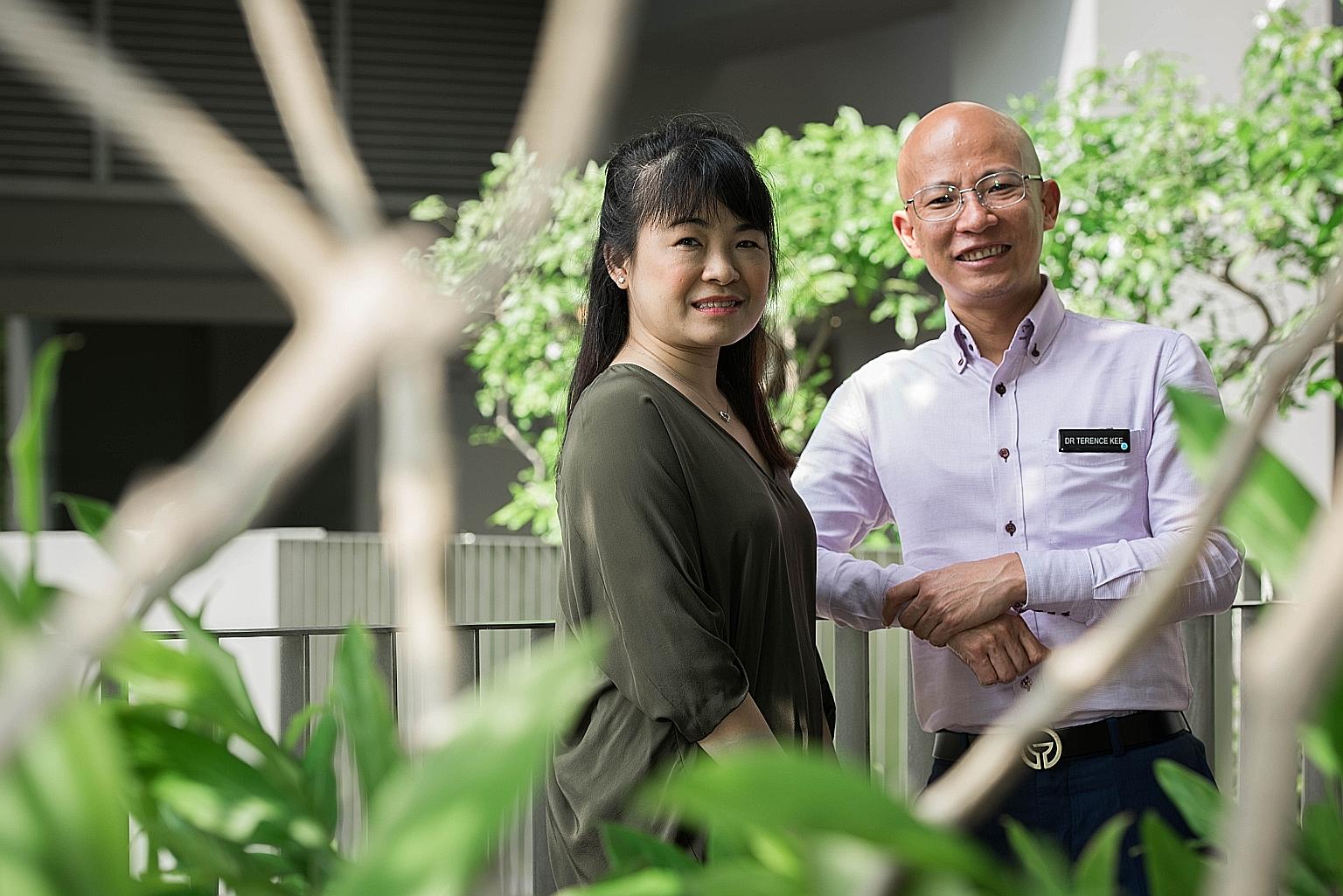SGH working to raise awareness of living donor transplants
Sign up now: Get ST's newsletters delivered to your inbox

Dr Terence Kee with Ms Lai Yoke Ling, the 1,000th patient at Singapore General Hospital to undergo a kidney transplant from a deceased donor.
ST PHOTO: SYAMIL SAPARI
Ankita Varma
Follow topic:
For nearly five years, 47-year-old Lai Yoke Ling spent at least nine hours at night hooked up to a peritoneal water dialysis machine at home, due to end-stage kidney disease.
She was 18 when she learnt she had presumptive chronic glomerulonephritis - a condition where the tiny filters in the kidneys that remove excess fluid and waste from the bloodstream become damaged due to inflammation.
By her early 40s, her kidneys had failed completely.
She had to have a catheter permanently inserted in her abdomen to carry out her daily dialysis, and battled side effects such as skin dullness and severe lethargy.
"Though I was able to function like a normal person in the day after doing my dialysis at night, it still did affect me in many ways," recalls the entrepreneur, who runs a photography studio with her husband.
"Travelling overseas was challenging as each day's worth of dialysis solution weighed 8kg, and the catheter in my abdomen meant I couldn't do things like swim or wear certain clothes - sometimes, it made me feel like a robot."
-
Living donor: What it involves
Anyone aged 21 and above who has normal kidney structure and function, and no significant risk of inheritable kidney disease, is eligible to be a living kidney donor.
Donors will be considered only if they have no history of cancer, diabetes, heart disease, stroke, active infections and are not an active substance abuser.
Before a donation can be made, tests will be done to check the general health of the potential donor and the recipient.
Donors will also meet a medical social worker and psychiatrist.
Once all the tests are done and the donor assessment is complete, documents will be submitted to the Transplant Ethics Committee for approval.
Surgery to remove the kidney is usually done using the keyhole method, which takes three to four hours. The average length of a hospital stay for donors is three to four days post-operation.
Once a donor is discharged they can resume normal activities and head back to work within four to six weeks.
Yearly clinic visits and tests will also be scheduled by the hospital to check on a donor's regular health as part of long-term care.
Ankita Varma
In January this year, her life changed when she became the 1,000th patient at Singapore General Hospital (SGH) to undergo a kidney transplant from a deceased donor, nearly 50 years after the hospital performed the nation's first such procedure back in 1970.
The milestone also highlights the viability of deceased and living donor transplants as an alternative to lifelong dialysis for patients suffering from end-stage kidney disease.
According to the National Kidney Foundation (NKF), Singapore ranks first in the world for cases of diabetes-induced kidney failure and sixth for new incidences of kidney failure.
In line with the Republic's increasing elderly population, the absolute numbers of patients with stage 5 kidney disease - the most severe stage - has also been rising steadily, from 680 in 1999 to 1,619 in 2015, according to the Singapore Renal Registry Annual Report 2016.
However, despite the high incidence rate of kidney failure, the transplant rate remains low, with only one transplant patient for every 100 on dialysis.
Most patients also opt to wait for a kidney from a deceased donor instead of from a living one, even though the wait for the former averages eight to nine years.
According to Dr Terence Kee, director of the renal transplant programme and a senior consultant in the department of renal medicine at SGH, the aversion among patients to ask relatives or friends for a kidney stems from emotional considerations and the fear of bothering their loved ones.
Ms Lai is one such patient - her younger sister offered to donate a kidney but Ms Lai refused.
"We get between 10 and 15 referrals for living donor transplants every month but most of these do not materialise into anything as many people do not want to pressure family members into making the decision," Dr Kee says. "This is unfortunate because the outcomes of patient and kidney survival over a five-year period is much higher in cases of living donor transplants."
To develop greater awareness of living donor kidney transplants, SGH is working to expand education resources on donation and transplantation through tie-ups with partners, such as NKF, and two guidebooks - one for family members who are learning about kidney donation as an option for their loved ones, and the other for those who have decided to be a living donor.
SGH is also expanding its referral network through link-ups with Changi General Hospital, Sengkang General Hospital and regional partners to ensure more patients can be educated on transplantation as an option.
They hope to dispel misconceptions that living donors will suffer from poor health after a transplant and that the risks involved in transplantation are very high compared with lifelong dialysis.
"Advances in medicine have meant that risks for healthy living donors are relatively low," says Dr Kee. "They have a less than 1 per cent risk of complications and a 1.5 per cent risk of kidney failure in the future as they are monitored closely with yearly checks.
"Keyhole surgery has also allowed for shorter recovery times, with patient survival over five years for living donor transplants increasing from 79 per cent in the 1970s to 99 per cent today. It has really made living donor transplantation the option with better outcomes."

